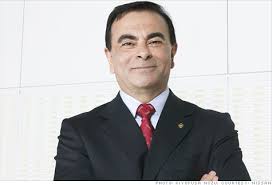Interpol is looking for Carlos Ghosn.
Officials in Lebanon say they have received an Interpol arrest warrant for ousted Nissan chief Carols Ghosn.
Ghosn fled Japan to Lebanon to escape what he called a “rigged” justice system in Japan, where he faced serious charges of financial wrongdoing when he ran Nissan and Renault.
Ghson was reportedly smuggled out of Tokyo by a private security company in a plan that was crafted over three months,
It is still not clear how Ghosn, who is a citizen of France, Brazil and Lebanon, was able to slip out of Japan. Reuters and the Financial Times have reported that he was smuggled out of Tokyo by a private security company — a plot that the media organizations say took months to concoct.
Turkish state media reported Thursday that seven people have been detained in Istanbul on suspicion of helping Ghosn flee to Lebanon. Anadolu news agency said that Ghosn traveled via the city’s Ataturk airport, where police detained four pilots of a private airline, two ground staff and the director of a cargo company. Flight tracker Flightradar24 showed a private jet flying from Osaka, Japan, to Istanbul and then another continuing to Lebanon at the time Ghosn is said to have arrived in the country.
Ghosn did not elaborate on his escape in his public statement earlier this week.
Legal experts and political analysts say that Japan is probably trying to figure out whether Ghosn violated immigration law when he left the country — not that there’s much of a chance of forcing him to return.
Prosecutors in Tokyo are now likely retracing Ghosn’s moves through Japan, collecting surveillance footage and searching for potential collaborators said Nobuo Gohara, a former prosecutor who now runs a compliance and law office in Japan.
Gohara added that Ghosn’s trial is almost certainly now canceled. The bigger question, he said, is how Japanese authorities will respond to Ghosn’s attacks on them, now that he is able to speak freely about his detention.
Ghosn has repeatedly denied the charges against him, and claimed that his arrest was part of a plot to remove him from the automotive empire he built. In his statement this week, he said he would “no longer be held hostage by a rigged Japanese justice system where guilt is presumed, discrimination is rampant, and basic human rights are denied.”
Japan can’t force Lebanon to send Ghosn back, said Keith Henry, the founder and representative director of Asia Strategy, a research and policy firm based in Tokyo. The two countries have no extradition agreement.
“It is a bigger deal for [Japanese Prime Minister Shinzo] Abe and Japan than for Ghosn,” Henry said. “No matter what they do now, it is very difficult to overcome the embarrassment of letting go one of the most high-profile suspects” of corporate scandal since Japan’s economic boom that followed World War II.



